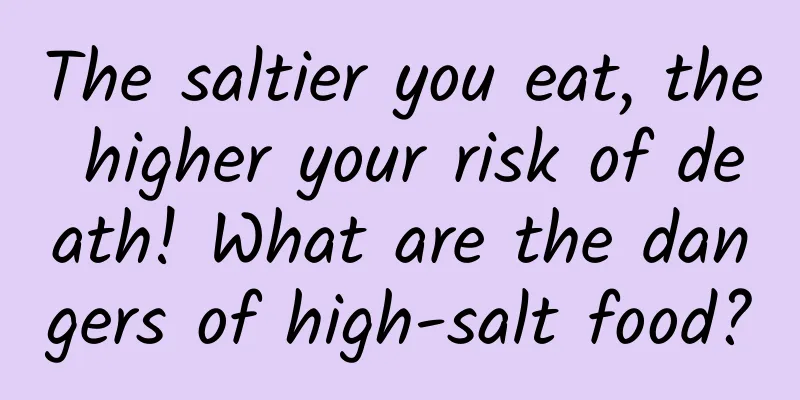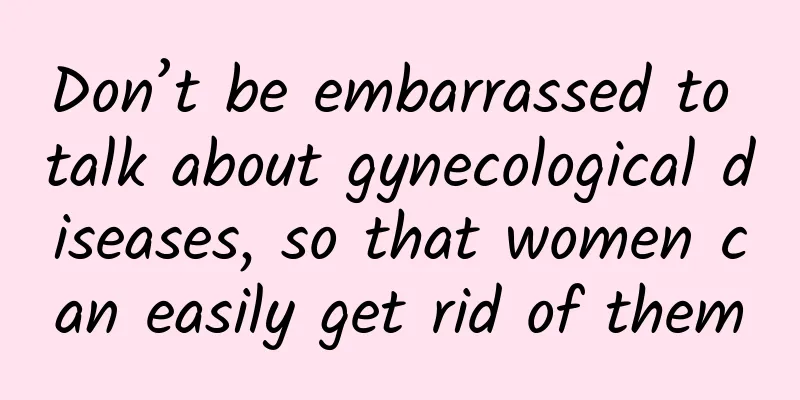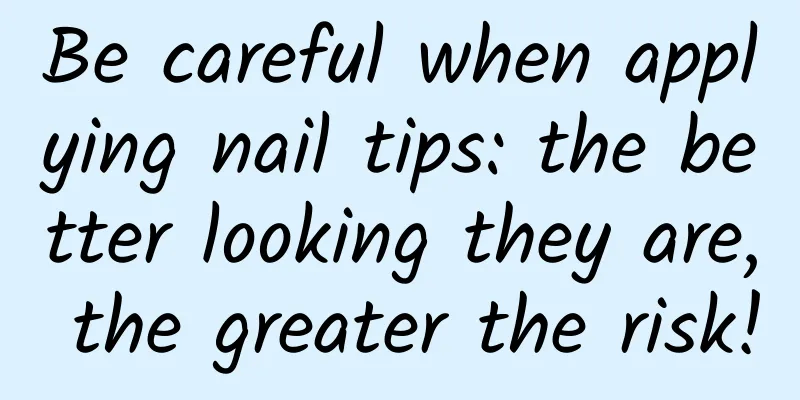The saltier you eat, the higher your risk of death! What are the dangers of high-salt food?

|
Speaking of salt, it is a condiment that everyone cannot do without for three meals a day. Without "salt", many dishes will be tasteless. Although salt can satisfy our appetite, excessive consumption will cause harm to the body. The World Health Organization proposes that the salt intake of adults should be less than 5 grams/day, and the China Hypertension Alliance proposes a daily intake of less than 6 grams based on China's national conditions. People who eat a high-salt diet for a long time are prone to some diseases. So what harm will eating too much salt cause to the body? How to eat salt reasonably? 1. The harm of high salt 01 Blood pressure rises . Studies have confirmed that the amount of salt consumed is closely related to the incidence of hypertension. When excessive salt intake is taken, in order to maintain fluid balance, the extracellular fluid will increase, the blood volume will also increase, and the blood pressure will also rise. And hypertension is the culprit of cardiovascular and cerebrovascular diseases such as atherosclerosis, coronary heart disease, and stroke. Image source: Pixabay The vast majority of hypertensive patients in my country suffer from salt-sensitive hypertension, and the clinical characteristics are a significant increase in blood pressure after a high salt load. 02 Damage to the liver Kidneys are important metabolic organs of the human body. About 95% of the salt in the human body is excreted through the kidneys in the form of urine. Excessive salt intake will cause edema and increase the burden on the kidneys. In addition, studies have shown that excessive salt will increase the protein in the urine, and increased urine protein is a dangerous signal of kidney damage! 03 Osteoporosis A high-salt diet causes the renal tubules to reabsorb sodium ions, which affects the absorption of calcium ions and makes calcium loss more likely. At the same time, sodium salt stimulates the parathyroid glands to increase the secretion of parathyroid hormone, causing a dynamic imbalance in bone metabolism, which makes osteoporosis more likely. 04 The main component of gastric cancer-promoting salt is sodium chloride. The chloride ions in it will increase the concentration of gastric acid. High concentrations of gastric acid will corrode the gastric mucosa, reduce the viscosity of the protective mucus in the stomach, and reduce its protective effect on the stomach wall, thereby promoting the occurrence of various gastric diseases. Epidemiological surveys have shown that there is a positive correlation between salt intake and gastric cancer risk! 05Upper respiratory tract infection High salt will affect the secretion of oral salivary glands, making it easy for bacteria and viruses to invade and multiply in large numbers. High-salt food will also hinder the proliferation and metabolism of oral and pharyngeal mucosal epithelial cells, thereby reducing local resistance and making upper respiratory tract infections more likely to occur. 2. How to use salt properly? The sodium ions in salt play an important role in maintaining human health. They can regulate body water, maintain acid-base balance, maintain normal blood pressure, and enhance neuromuscular excitability. Excessive salt restriction has certain side effects, so we must learn to "reduce salt" correctly in our daily lives. Today, I will share with you "Seven Ways to Reduce Salt". Use a salt control spoon: A scaled salt control spoon is clear and intuitive, and comes in different sizes. For example, 0.5 g, 1 g, 2 g, and 5 g. You can buy it according to your needs. If there are two people eating, the maximum amount of salt per day is 10 g, which averages to about 3 g per meal. You can use a 2 g or 1 g salt control spoon. Add salt when cooking: Do not add salt during cooking, as this will cause some of the salt to enter the ingredients, making the taste bland, which will lead to adding more salt. Adding salt when cooking allows the salt to adhere evenly to the surface of the ingredients, making it easier for the tongue to sense the saltiness, thus reducing the amount of salt used. Use vinegar for seasoning appropriately: The saltiness can be enhanced by a small amount of acetic acid, but do not add too much vinegar, otherwise it will weaken the saltiness. You can add a little bit more and season gradually. Use natural seasonings: When cooking or stewing soup, be good at using star anise, bay leaves, thirteen spices, pepper, Sichuan pepper, onion, ginger, garlic and other seasonings to reduce the amount of salt used. Pay attention to hidden salt: If you use soy sauce or fermented bean curd for seasoning, you should use less or no salt. 10 ml soy sauce contains about 1.6 g salt, and 20 g fermented bean curd contains about 1.5 g salt. Read the nutrition label: When buying packaged food, pay attention to the sodium content on the nutrition label. Choose the one with the lowest sodium content among the same food and refuse high-salt food (food with sodium content ≥ 800 mg/100 g). You can convert it into salt to measure your salt intake. Divide the sodium content on the label by 400 and then multiply it by the corresponding specification. In addition, you should also pay attention to eating less processed foods such as pickled vegetables, kimchi, ham, instant noodles, bacon, etc.
3. If you have these 5 symptoms, you should reduce your salt intake. Excessive salt intake will cause changes in your body. If you have these symptoms, it means you have eaten too much salt and you need to limit it. 01Skin becomes rough Gao Jian, director of the Nutrition Department of Zhongshan Hospital affiliated to Fudan University, said that eating too much salt will increase the sodium ions in the body, which will cause problems in the water exchange process of cells and cause the skin to become rough. 02 Facial swelling If you eat too much salt, sodium ions will hinder the absorption of potassium ions, causing blood circulation to slow down and excessive water to be retained in the body, which can cause facial edema. 03 Frequent urination If a person eats too much salt, the kidneys will work hard to metabolize and excrete the excess sodium, which can easily cause increased urine volume and lead to increased calcium loss. 04 Frequent thirst Sodium ions are mainly responsible for maintaining the balance of water and electrolytes in the human body. Excessive salt intake will disrupt the cell balance, leading to dehydration and thirst. 05Fingers become thicker Due to the existence of osmotic pressure, salt will accumulate in a certain part of the body. If it accumulates in the fingers, it will cause local edema and cause the fingers to become thicker. Source: Chongqing Tianji Network Co., Ltd. Source: 39 Health Network, Weinan Central Hospital Health Management Center, Changxiao Health, Science Popularization China Statement: Except for original content and special notes, some pictures are from the Internet. They are not for commercial purposes and are only used as popular science materials. The copyright belongs to the original authors. If there is any infringement, please contact us to delete them. |
<<: Why is pre-transfusion testing necessary?
>>: Does drinking tea really help digestion?
Recommend
Can I detect pregnancy in less than one month?
In our daily life, many women in the early stages...
What should pregnant women eat after giving birth?
For women who have just given birth, nutritional ...
Is it better to peel or not peel sweet potatoes when baking in the microwave? How to bake sweet potatoes in the microwave
We all know that sweet potatoes are a popular foo...
Why is there no light in your eyes when you grow up?
Overwhelmed by life and work? Or is it too pollut...
What to eat to nourish the body after medical abortion
As medical technology continues to develop, the m...
Normal hcg and progesterone values at 5 weeks of pregnancy
At five weeks of pregnancy, the pregnancy-related...
What to do if you have breast engorgement and fever
Many mothers will have a fever due to breast engo...
Is it good for the fetus if pregnant women sleep every day?
I believe that every pregnant woman treats the fe...
What are the benefits of squatting for women?
What are the benefits of squatting for women? Now...
What's the matter with a pimple on the vulva?
Generally speaking, the bumps on the vulva do not...
Stomach pain at 15 weeks of pregnancy
The 15th week of pregnancy is the early stage of ...
How to distinguish cholesterol polyps from adenomatous polyps in gallbladder?
In B-ultrasound examination, the distinction betw...
Metronidazole for gynecological inflammation
Key reminder: Ornidazole is a very commonly used ...
The role of placenta tablets in women
The placenta is where the fetus lives, and it is ...
The pregnancy test stick shows two lines, does it mean I am pregnant?
Women who use pregnancy test sticks for the first...









